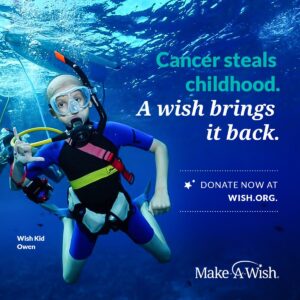

MedCity News is proud to announce a collaboration with the Make-A-Wish Foundation to highlight the extraordinary power of a wish through monthly feature stories at MedCityNews.com. Make-A-Wish grants wishes to children facing critical conditions, bringing joy to children and families who are otherwise challenged with the day-to-day obstacles of managing complex medical conditions. Through this partnership, MedCity News will feature a monthly story, crafted by the Make-A-Wish team or partner organization focusing on how healthcare organizations are striving to lift up the voices of the youngest patients battling critical diseases.
 MedCity News will also donate access to its influential website, email and social media reach to amplify the monthly featured story to the leaders of innovation in healthcare. The announcement was made Monday at the HLTH conference in Las Vegas.
MedCity News will also donate access to its influential website, email and social media reach to amplify the monthly featured story to the leaders of innovation in healthcare. The announcement was made Monday at the HLTH conference in Las Vegas.
Make-A-Wish currently has three corporate partners in the healthcare field, in addition to relationships with over 50 children’s hospitals. The monthly feature stories will spotlight how wishes, facilitated by these organizations, have a remarkable effect on both the children and their families.
The idea for the Make-A-Wish collaboration with MedCity News came from Dr. Sachin H. Jain, president and CEO of CareMore and Aspire Health, who last year joined the national Make-A-Wish Board of Directors. The following exchange reveals what attracted Dr. Jain to Make-A-Wish America and how wish-granting can be extended to others besides children.
MedCity News: Why did you join the Make-A-Wish America board?
Jain: Make-A-Wish is such an important organization. It gives hope to young people at the moment when they need it most, by helping to grant what the organization refers to as a person’s “one true wish,” the singular and highest hope of the child facing a complex medical problem. So much of medical care strips patients of their identities outside of their disease and patients and their families can become laser-focused on illnesses and their treatments. By focusing on fulfilling wishes of children, Make-A-Wish helps reaffirm their humanity by acknowledging their deepest and most fundamental hopes, dreams, and desires, giving them something outside of their disease on which to focus. Sometimes it’s something grand like a trip to Hawaii to see a volcano. Other times, it’s something I would like to do, like meet Dwayne Johnson, “The Rock!” And often, it’s something as simple as wishing for a pet bunny.
As a physician who is a strong advocate for humanism and a holistic approach to addressing the needs of patients, it was hard not to join the board when asked to do so.
A little bit after I joined the Make-A-Wish Board, a close friend’s child was diagnosed with a critical genetic disease. I was blown away by how quickly the Georgia chapter of Make-A-Wish acted to grant her wish—a Moana-themed visit to Disney World. So now it’s personal for me.
MedCity News: What made you think of a collaboration with our publication?
Jain: MedCity News has been at the forefront of emphasizing the patient voice in the healthcare industry. It was one of the first things that impressed me about MedCity News when it was launched and as I participated in its conferences as a speaker. The focus of MedCity News’ coverage is not exclusively industry buzz—instead, there’s an interest in telling the story of patients and reaffirming the importance of the patient voice. That’s why I wanted to explore how Make-A-Wish and MedCity News could partner together to talk about the extraordinary impact of Make-A-Wish. I’m so grateful to both partners for their willingness to join together.
MedCity News: What is something you would like our readers to know about Make-A-Wish?
Jain: One of the most fundamental misunderstandings about Make-A-Wish is that it only serves children with terminal illnesses. To be clear, Make-A-Wish does serve many kids who have terminal diagnoses — like my friend’s daughter.,This is so important. But it also serves many young people with serious chronic diseases who are not terminal. In fact, many of our wish kids grow up to lead happy, healthy lives. The effect of a wish is remarkable, as it gives so much hope to young people who really need it. You can’t underestimate the transformative power of that hope.
I also want to let readers know that there are many ways that you can help Make-A-Wish. You can, of course, donate to the national organization or a local chapter. You can also volunteer through event coordination, administrative office work at a chapter or as a wish-granter who works with children and their families to help them identify their one true wish.
MedCity News: You lead CareMore and Aspire Health, two companies known for their keen focus on senior populations. Though serving senior citizens is not a part of the Make-A-Wish mission, do you believe there is a role for wish-granting in those populations?
Jain: Absolutely, without question. No matter who we are—we all have unfinished business. And sometimes, especially as we age, we need the help of others to finish that unfinished business. So, I think there is a role for wish-granting—no matter what your age—though I believe it starts with listening to patients and giving them permission to chase what they really want in life.
Last year, I saw a patient in clinic recently diagnosed with cancer whose prognosis was poor. His oncologist advised that he stop everything that he was doing—and begin chemotherapy whose benefits might be an extra few months of life—most of which would be spent shuttling to and from appointments.
He had a long-standing trip planned to travel with his family to Boston to fulfill a lifelong desire to see Fenway Park. He came to my clinic and asked me whether he should cancel his trip.
As painful as these words were to utter as a Yankees fan, I told him: Go to Fenway.
Whether a child or senior citizen, great medical care begins with a simple, but profound question: What’s important to you?
And at the heart of that is finding out about people’s deepest desires—their one true wish.












